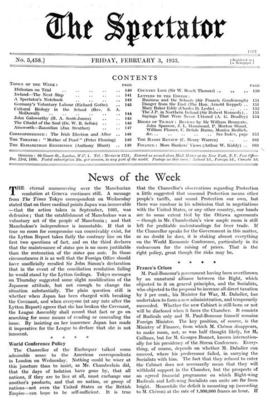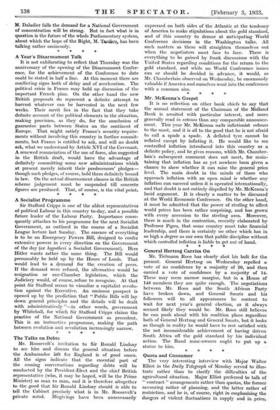France's Crises
M. Paul-Boncour's government having been overthrown by an unnatural alliance between the Right, which objected to it on general principles, and the Socialists, who objected to the proposal to increase all direct taxation by 5 per cent., his Minister for War, M. Daladier, has undertaken to form a new administration, and temporarily succeeded. Whether the new Cabinet is still-born or not will be disclosed when it faces the Chamber. It consists of Radicals only and M. Paul-Boncour himself remains Foreign Minister. The key position, of course, is the Ministry of Finance, from which M. Chdron disappears, to make room, not, as was half thought likely, for M{ Caillaux, but for M. Georges Bonnet, known internation- ally for his presidency of the Stresa Conference. Every- thing, of course, depends on whether M. Daladier can succeed, where his predecessor, failed, in carrying the Socialists with him. Tile fact that they refused to enter the Cabinet does not necessarily mean that they will withhold support in the Chamber, but the prospects of an agreed financial programme on which Right-Wing Radicals and Left-wing Socialists can unite are far from bright. Meanwhile the deficit is mounting up (according to M. Cheron) at the rate of 1,300,000 francs an hour, If M. Daladier falls the demand for a National Government of concentration will be strong. But in fact what is in question is the future of the whole Parliamentary system, about which the hope of the Right, M. Tardieu, has been talking rather ominously.
• * • *





































 Previous page
Previous page